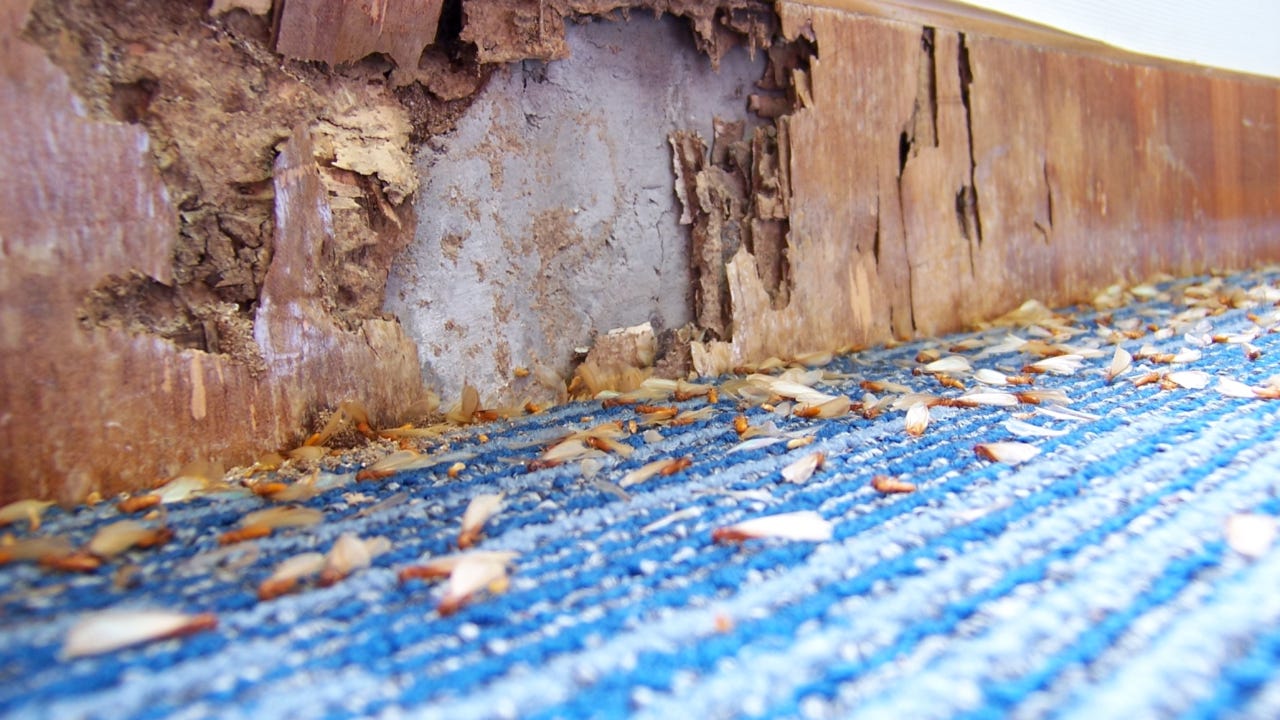Should you buy a home with termite damage?




Buying a house with potential red flags in a home inspection can give buyers some apprehension. But buying a house with significant termite damage? Well, that can be a terrifying deal-breaker. However, with housing inventory low and demand high, many buyers are considering things that they might not have before in order to score a home — including dealing with termites.
Doing so can be costly. According to the National Pest Management Association, termites cause more than $5 billion in property damage each year. What’s more, these costs are generally not covered by homeowners insurance.
Before you’re completely scared off, though, know this: A home with termite damage doesn’t have to be a pariah. What to do if you love a house but hate its termites? First, find out how bad the damage is, whether it can be fixed and what an inspector recommends to rid the home of the pests. Then, see if you can negotiate a resolution with the seller. Here are some key considerations to keep in mind before you buy a house with termite damage.
Should you buy a home with termite damage?
Just because a house has termite damage doesn’t mean you should automatically write it off. A lot depends on how bad the damage is and what it will cost to remedy.
If you live in a region that has a high probability of termite infestation — as is the case in parts of California, Florida and Louisiana, due to high temperatures and soil qualities — you might come across termite damage in your home search. If the damage is caught early, it can often be fixed with minimal issues.
In fact, termite damage might actually be a bargaining chip. Take Mike Kistner as an example. Kistner, a Realtor with PMZ Real Estate in Lodi, California, bought a home that had termite damage the seller had disclosed before Kistner made an offer. The seller agreed to tent the home for termite fumigation before a home inspection. Afterward, the inspection report came back clean and Kistner was able to negotiate $2,500 from the seller for minor repairs to avoid future infestations. “Since I moved into the home, everything has been fine,” he says.
Not everyone is as lucky, though. Glen Ramsey, a board-certified entomologist and technical services manager for pest-control brands like Orkin, says that termites don’t necessarily go away as easily as other types of pests. And that presents a challenge, especially if you need to close quickly.
“Visible damage is usually not the full extent of it — termites are cryptic, which leads to potential damage in areas that you’re unable to see,” Ramsey says. “That can be dangerous because the damage may be significant, both structurally and financially.” In other words, you could be facing structural damage and paying out of pocket for expensive repairs.
Get a specialized pest inspection
Even if a seller discloses termite damage upfront, it may not be obvious how extensive the damage is or if there’s still an active infestation. That’s why it’s important to get a professional home inspection and, beyond that, seek the help of a pest professional, as well as a licensed contractor, to help you understand the extent of the termite damage. If possible, have these inspections done during swarming season, so you have a better shot at uncovering all of the damage.
A standard home inspection won’t cut it; a typical home inspector typically looks mainly at major components that are easily accessible. A pest inspector, on the other hand, will look specifically for evidence of termites and other pests.
Once you get the inspection reports back from the professionals, you’ll need to decide whether to proceed with the purchase. Even if the damage is minimal, never assume you’re 100 percent in the clear once the home is treated.
“Make sure you discuss the risks of proceeding with the purchase and have a reserve fund available to address any concerns that arise afterward,” Ramsey says. He recommends that homebuyers work with a pest-management professional to decide on the best ongoing treatment plan. Also, it couldn’t hurt to look into what your homeowners insurance policy will and won’t cover when it comes to termite damage and consider specialty coverage, if necessary.
Negotiate termite damage repairs
Once you know about termites, the next logical question is who will pay for repairs and treatment to send those pests packing? The answer isn’t so simple.
One way to protect yourself from the start is to include a home inspection contingency, which gives you a way out of the purchase contract without penalty if the inspection report uncovers major problems, says Ron Humes, a registered builder and principal broker at HomeSelect Realty in Lexington, Kentucky.
Under current housing market conditions, many buyers are choosing to waive the home inspection contingency entirely in the hopes of making their offer more appealing to sellers. But if you live in an area with termites or suspect damage home, doing so may be foolhardy, says Kistner.
“When you find termite damage during the inspection period, I’d submit an addendum requesting they tent the property,” he says. “I would also ask the seller to get the damage repaired by a licensed contractor and provide receipts, because not all (lenders) will let a homebuyer proceed (to loan approval) with termite damage.”
Since more damage can crop up as repairs are being made, make sure to delay the closing until everything has been taken care of.
How much does termite treatment cost?
The costs for treatment depend on how extensive the infestation is and how much damage has been caused. Significant termite infestation treatment can set you back $228 to $956 or more, depending on the size of the house, according to HomeAdvisor. Structural repair costs will vary widely depending on location and the contractor’s experience, but expect to shell out a few thousand dollars or more if extensive repairs are needed.
If the seller isn’t willing to make repairs, then you can either walk away from the sale (with a contingency) or negotiate further. This can include getting quotes from licensed contractors and requesting that the seller provide the amount as a cash credit that can be applied toward your closing costs.
Bottom line
Buying a house with termite damage doesn’t need to be a deal-breaker, but it can take extra time and effort, so make sure you’re ready to roll your sleeves up. Sure, it might be burdensome to get more home inspections or negotiate with a seller. However, the up-front costs and hassle pale in comparison to the debacle you could face later if termites continue to ravage your dream home.
Why we ask for feedback Your feedback helps us improve our content and services. It takes less than a minute to complete.
Your responses are anonymous and will only be used for improving our website.




